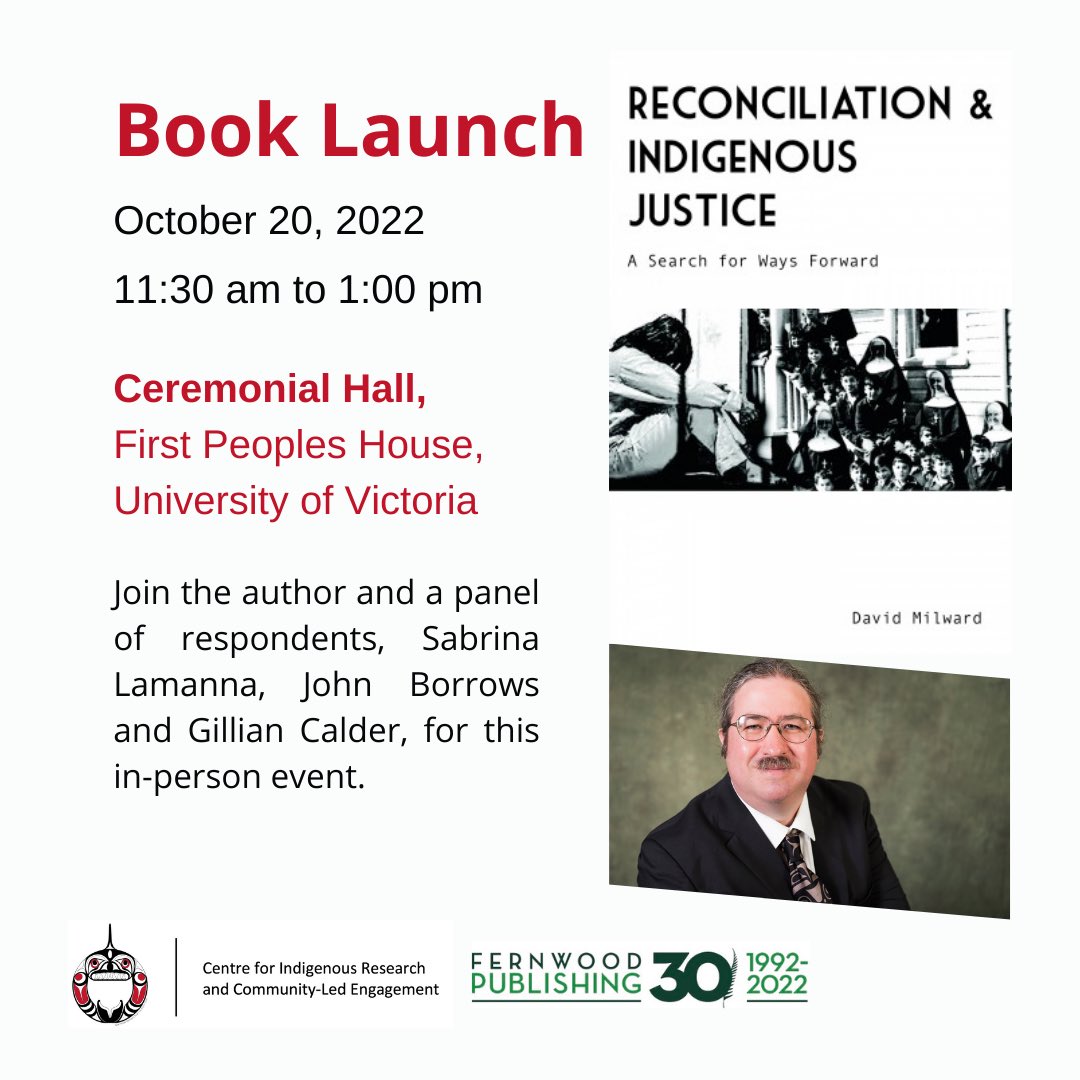David Milward’s new book addresses the crisis of Indigenous over-incarceration in Canada’s criminal justice system
Dr. David Milward’s newest book, entitled Reconciliation and Indigenous Justice: A Search for Ways Forward, was launched on October 20, 2022 during a special event at the Ceremonial Hall of First Peoples House at UVic. The in-person event featured Milward, along with a panel of respondents that included Sabrina Lamanna, John Borrows and Gillian Calder.
The book, Milward’s third, explores the lasting fallout from the Indian residential school system in Canada and the history of violence and intergenerational trauma which is a key contributing factor to the current crisis of Indigenous over-incarceration in the criminal justice system.
“There seems to be a sort of denial, in large segments of Canadian mainstream society, that residential schools were a thing of the past and there is no longer any ongoing responsibility or connection to the present,” explains Milward. “A large objective of the book is to prove otherwise.”
In detail, the book explores what truth and reconciliation means in the context of criminal justice.
“Canadian law still has such a heavy emphasis on answering social problems with incarceration,” says Milward. “I want to show there are better ways to go about this, partly preventative programming in Indigenous communities, but also alternatives to incarceration itself. The reminder needs to be put out there again and again, that we need to approach Indigenous incarceration differently.”
Milward proposes a number of ways forward to address the lasting impact of the residential school system on survivors, their families, and their communities.
“It’s a social cancer that usually spreads from generation to generation, we have a multiplicity of those factors that affect Indigenous families and communities,” he says. “The use of preventative programming, even something like providing services through a recreation centre to address problems such as widespread substance abuse, poverty and intergenerational trauma with youth can have a positive impact, with the idea being to try and mould healthier Indigenous communities and to avoid the need for police to come in and to charge someone.”
Milward hopes that his book leads to much needed conversations about how to tackle the problems of Indigenous over-incarceration. “It is my hope that I can affect change in society,” he says. “Whether it’s policymakers or Indigenous peoples or Canadian society at large, I am hoping that people will start to look at doing things differently.”
The reviews for his latest book have been uniformly positive, praising Milward for his clear and pragmatic insights.
“David Milward provides a clear-sighted and accessible engagement with the challenge of Indigenous over-incarceration and the continuing legacy of Indian Residential Schools, using compelling examples to present a pathway for doing justice better in Canada,” says Andrew Woolford, author of The Politics of Restorative Justice and Professor, Department of Sociology and Criminology, at the University of Manitoba. While Kent Roach, Professor of Law and the University of Toronto calls it: “Essential reading for anyone who wants to understand how the Canadian criminal justice system fails Indigenous people and how Indigenous Justice can, under the right conditions, be fairer, less expensive and more effective.”
Milward is a member of the Beardy's & Okemasis First Nation in Saskatchewan, and Associate Professor of Law, as well as the Director of the JD/JID program at the University of Victoria. Previously, he was an Associate Professor of Law with the University of Manitoba. He has numerous publications in international and leading national law journals in the areas of criminal law, evidence, and Indigenous justice.
His first book, Aboriginal Justice and the Charter, won the K.D. Srivastrava Prize in 2012 for the best book published by U.B.C. Press that year. It was also short-listed for the Canadian Law and Society Association Book Prize Award that same year.
His second book, The Art of Science in the Canadian Justice System: A Reflection on my Experiences as an Expert Witness, was co-authored with the late Dr. Charles Ferguson. The book describes Dr. Ferguson's experiences with calling into question deficient forensic science evidence in Canadian courts, particularly that of former Ontario forensic pathologist Dr. Charles Smith.
His third, and latest book, Reconciliation and Indigenous Justice: A Search for Ways Forward, is available for sale in print and digital versions, through Fernwood Publishing.
Contact:
Ivan Watson
UVic Law Communications
250-418-0700
lawcomm@uvic.ca

